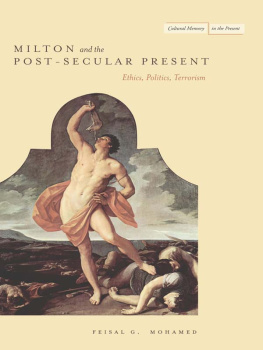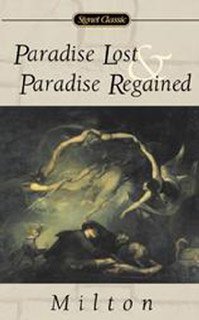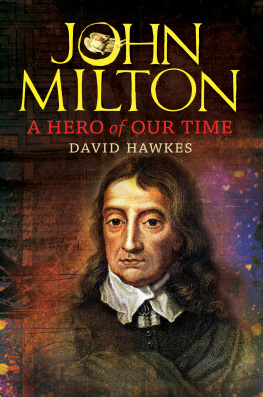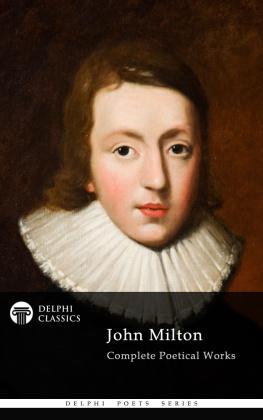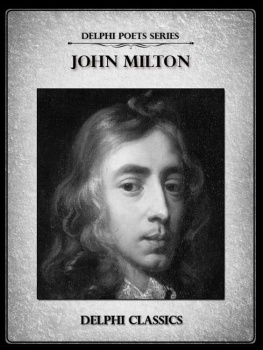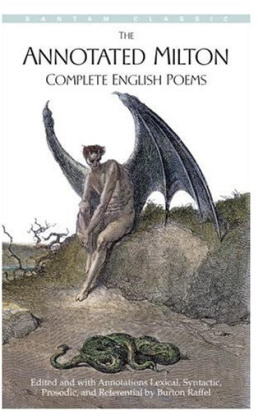MILTON AND THE POST-SECULAR PRESENT
Cultural Memory
in
the
Present
Mieke Bal and Hent de Vries, Editors
MILTON AND THE POST-SECULAR PRESENT
Ethics, Politics, Terrorism
Feisal G. Mohamed
STANFORD UNIVERSITY PRESS
STANFORD, CALIFORNIA
Stanford University Press
Stanford, California
2011 by the Board of Trustees of the Leland Stanford Junior University. All rights reserved
No part of this book may be reproduced or transmitted in any form or by any means, electronic or mechanical, including photocopying and recording, or in any information storage or retrieval system without the prior written permission of Stanford University Press.
Printed in the United States of America on acid-free, archival-quality paper.
Library of Congress Cataloging-in-Publication Data
Mohamed, Feisal G. (Feisal Gharib), author.
Milton and the post-secular present : ethics, politics, terrorism /Feisal G. Mohamed.
pages cm. (Cultural memory in the present)
Includes bibliographical references and index.
ISBN 978-0-8047-7650-9 (cloth : alk. paper)
ISBN 978-0-8047-7651-6 (pbk. : alk. paper)
1. Milton, John, 16081674Criticism and interpretation. 2. Ethics in literature. 3. Politics in literature. 4. Terrorism in literature. 5. Religion and politics. 6. Postsecularism. I. Title. II. Series: Cultural memory in the present.
PR3588.m57 2011
821'.4 dc22 2011006590
Typeset at Stanford University Press in 11/13.5 Garamond
E-book ISBN: 978-0-8047-8073-5
For my parents
Acknowledgments
This book has grown out of lively conversation with other scholars, many of whom have offered both encouragement and critique (in its own way a valuable form of encouragement). I am especially grateful to those who have commented on earlier drafts of its chapters, both in writing and in conference settings: Phillip Donnelly, Stephen Fallon, Stanley Fish, Eliane Glaser, Kenneth Graham, Marshall Grossman, Christopher Kendrick, John Leonard, Michael Lieb, David Loewenstein, Leah Marcus, Ryan Netzley, Mary Nyquist, Annabel Patterson, Balachandra Rajan, Bruce Rosenstock, Stella Purce Revard, Carter Revard, John Rumrich, Regina Schwartz, Jeffrey Shoulson, Eric Song, Mihoko Suzuki, Paul Stevens, Gordon Teskey, David Urban, Nicholas von Maltzahn, and Susanne Woods. Deserving special acknowledgment are Peter Herman and Joseph Wittreich, valued friends with a very different take on Milton.
Completion of this project coincided with a move to the University of Illinois, which has proven to be as intellectually lively a campus as one could wish for. My colleagues in early modern studies have been enormously generous (thats you, Curtis Perry) and equally tough (thats you, Carol Neely); I am very fortunate to be a member of this scholarly community. That is also true of my colleagues in the Unit for Criticism and Interpretive Theory, of whom I thank especially Michael Rothberg and Lauren Goodlad. The Illinois Program for Research in the Humanities provided a fellowship at a key moment in this books composition, which afforded precious release time and valuable conversation with faculty and graduate students from across the humanities; particularly helpful were Dianne Harris and Sarah Projansky.
An earlier version of appeared as Reading Samson in the New American Century, Milton Studies 46 (2007): 14964. I thank the publishers of these journals for granting permissions.
I am grateful to the anonymous readers and editorial staff of the Stanford University Press, especially Emily-Jane Cohen, whose interventions have made the book more clear at key points; Sarah Crane Newman and John Feneron shepherded the manuscript into production with care and efficiency.
This space allows me to give thanks for the thankless task of preparing the index, which fell to Erin Chandler, doctoral candidate at the University of Illinois.
My deepest debts are personal and cannot be expressed on an acknowledgments page. As ever, nothing would seem possible or worthwhile without my wife, Sally. Ive dedicated this book to my parents: my father, who taught me to value knowledge, and my mother, whose warmth and humor made me a humanist.
A Note on Texts
Unless otherwise indicated, all references to Miltons poetry are to Paradise Lost, ed. Barbara K. Lewalski (Oxford, 2007), and Complete Shorter Poems, ed. Stella P. Revard (Oxford, 2009). References to Miltons prose are to the Complete Prose Works, 8 vols. in 10, ed. Don M. Wolfe et al. (New Haven, 195382), and are indicated in parentheses by the abbreviation YP.
MILTON AND THE POST-SECULAR PRESENT
Introduction
Since I became a tramp, Im a somewhat better man. I couldnt preach to em anymore.
The Chaplain in Bertolt Brechts Mother Courage and Her Children
Bertolt Brecht perceived clear parallels between the human cost of religion in the seventeenth century and the human cost of radical politics in the twentieth century. In the wake of the Munich agreement that opened Eastern Europe to Nazi expansion, and the growing recognition among communists of the excesses of Stalinist absolutism, Brecht composed the Life of Galileo, a play, as he describes it, concerned not with ecclesiastical resistance to scientific inquiry so much as with the temporary victory of authority, and meant to reflect upon present-day reactionary authorities of a totally unecclesiastical kind.
Brechts turn to the seventeenth century at the outbreak of the Second World War implies that comprehensive doctrines lend themselves readily to the assertion of oppressive authority, be they religious or secular, be they of the political right or left. But he is equally skeptical of the lack of conviction serving the interests of the bourgeois center. On one hand, the passage spoken by the Chaplain in Mother Courage that is the epigraph of this introduction suggests that something of humanity is lost in an absolute fidelity to principle. On the other hand, Brecht claims that the politicians faced by Galileo were refreshingly guided by spiritual and scientific commitments in a way that their bourgeois counterparts are not. Adherence to doctrine can elevate human endeavor beyond mere interest; in the same stroke doctrine denies non-adherents full participation in the society it imagines.
That Brechtian concern is very much at the heart of this book, which explores the turn in current thought to the realm beyond contingent events. Skepticism on its own, the worry seems increasingly to run, can devolve into a nihilist acceptance of the given eschewing strong ethical and political engagement. And despite its critique of axio-teleology, current skepticism can take as axiomatic the ambiguity of phenomena and see its own rationalism and self-conscious discursiveness as the end of a telos where grand narratives are meant to be outgrown. In this climate contingency and ambiguity have become the Castor and Pollux of the humanities in whose temple books and articles are blindly offered. Devotion to these twin gods can be as uncritical as any doctrine, and have its own troubling implications.
Perhaps more than any other poet, John Milton makes us keenly aware of the limits of an emphasis on ambiguity, for his writings continually subsume contrary energies to a truth presenting itself phenomenologically through the workings of an enlightened soul. With iconoclastic verve he launches salvoes of believed truth against tyranny in church and state. As we shall see, Milton makes us equally aware of the limits of a view of human liberty growing out of an adherence to truth, a view that does not fully accept the principle of equality. That shortcoming can be reproduced in the present-day thought that we will explore.
Next page
